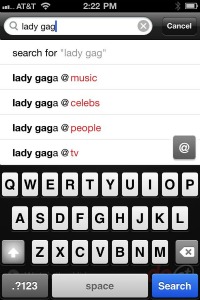Israeli startup Do@ aims to “app-ify” the mobile web so smartphone users can search across apps rather than generate an unwieldy list of links.
The Internet has had a good run. More than two billion people are connected around the world, and there’s no shortage of fascinating and valuable information flowing our way. But the Internet just isn’t cutting it on mobile smartphones. The screens are too small, and searching through a Google list of five million links doesn’t satisfy that “on-the-go” need for info.
An Israeli startup has developed a “fix” for the mobile Internet: Do@ (pronounced “do at”) aims to “app-ify” the web. Do@ co-founder Ami Ben-David explains that his company makes an iPhone app that searches other apps rather than Internet sites.
“On a desktop computer, it’s perfectly fine to search on Google,” explains Ben-David. “But not when you’re on the street with your mobile phone. Going to a browser on a small iPhone, typing in a URL and then getting a page of links is not what people want. They’re used to apps on their phone.”
Put another way, he says: “We’re taking the Internet into the iPhone age.”
Apps are where it’s at
Already a few years ago, Apple CEO Steve Jobs declared that on a mobile device, “search hasn’t happened. What is happening is that [people] are spending all of their time in apps.”

For the uninitiated, apps are single-function programs that run on smartphones. They provide access to a specific service, such as booking a movie at your local theater or analyzing the calorie count in a crunchy granola bar. Apps are a big deal; the iPhone platform alone has more than 425,000. Most are free, but a number of developers are making a handy living with $1-an-app downloads.
The beautiful simplicity of these single-use apps is also their major pitfall: you have to open the apps one at a time to search in them. Do@, by contrast, allows you to search across apps – currently more than 1,000 of them. If you like the results that Do@ delivers, you never have to open individual apps.
Moreover, you don’t even have to have a specific app on your phone to view a neatly organized result. If Do@ decides that Flixter has the best reviews or trailers of a new movie, you don’t need to install Flixter before the content displays within Do@.
If a website doesn’t have its own app, Do@ will work with the site administrators to app-ify their content, often for free. That’s because Do@ makes money from apps that sell products. If you book a movie ticket on Fandango, Do@ takes a cut. Buy a new hard drive on Amazon — Do@ makes a few bucks. Ditto for the deal of the day via Groupon or LivingSocial. In this way, Ben-David hopes that Do@ will always be available at no cost.
A nod from Microsoft
Investors seem to think the business model has legs. In May, Do@ raised $7 million in a first financing round led by Draper Fisher Jurvetson. BRM Capital, DFJ Tamir Fishman Ventures and angel investor Yaniv Golan invested in Do@’s seed round. The total money raised now stands at $8.7 million, much of which will go toward marketing.

The app launched a couple of months ago and is now focusing on techie early adopters in order to learn more about what people are searching for.
Ben-David provides an example. “Let’s say you type in ‘Madonna.’ What do people want to see? Madonna’s music? Her movies? Celebrity gossip?” By watching what people type and by hooking into their social media profiles (with permission, of course), Do@ now knows that it’s music, then gossip and movies for that media mogul. Or take Liverpool. “Usually people want to know about the soccer team more than the city itself,” Ben-David says. “About 90% of what we’re doing now is through this learning curve. We don’t want people to work too hard.”
Ben-David, 44, was born in Bnei Brak and lives in London, dividing his time between the Israeli headquarters, with its staff of 15, and clients in the United States. He moved to London five years ago to work for Oberon Media. Before that, he founded Kibi Mobile, which sold smartphone content in retail environments. The company raised $2.5 million from Siemens and from private investors in Israel before going public on the London Stock Exchange.
Ben-David and Joey Simhon founded Do@ with Rami Kasterstein, who serves as Do@’s CEO. Ben-David and Kasterstein had worked together 20 years earlier in Israel, when they launched a subsidiary of the tech company Aladdin. They’d been itching for a way to work together ever since. “We all work with Skype. It’s much less important where you are now,” Ben-David says.
Do@ was unveiled at the New York TechCrunch Disrupt conference in May, where it won the “Bing” award. The prize was a high-level meeting at Microsoft, makers of the Bing search engine. Ben-David says it was a nice acknowledgement “that we are valuable.”
Do@ is so far only available on the iPhone, and only in the United States, although the company definitely has global ambitions. An Android version is coming soon, as is one that works on Windows 7. Tablets like the iPad will only come after – it’s not as difficult to use a browser on a device that size, though the popularity of iPad apps means that the Do@ can’t stay away for too long.














